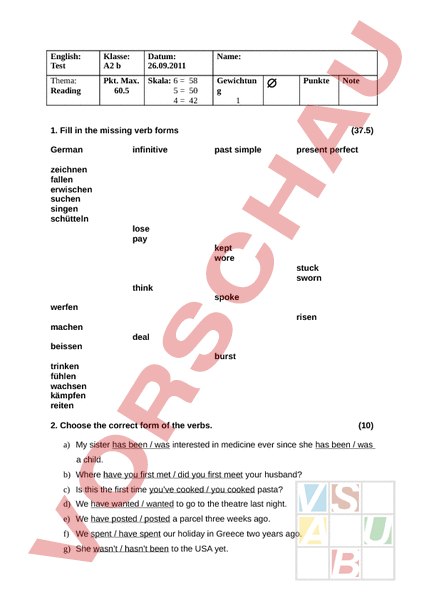Arbeitsblatt: Test Past simple - present perfect
Material-Details
Test zu past simple present perfect, unregelmässige Verben, Lückentext
Englisch
Grammatik
8. Schuljahr
3 Seiten
Statistik
87724
749
14
06.10.2011
Autor/in
Rahel Zois
Land: Schweiz
Registriert vor 2006
Textauszüge aus dem Inhalt:
English: Test Klasse: A2 Datum: 26.09.2011 Name: Thema: Reading Pkt. Max. 60.5 Skala: 6 58 5 50 4 42 Gewichtun 1 Punkte 1. Fill in the missing verb forms German infinitive Note (37.5) past simple present perfect zeichnen fallen erwischen suchen singen schütteln lose pay kept wore stuck sworn think spoke werfen risen machen deal beissen burst trinken fühlen wachsen kämpfen reiten 2. Choose the correct form of the verbs. (10) a) My sister has been was interested in medicine ever since she has been was child. b) Where have you first met did you first meet your husband? c) Is this the first time youve cooked you cooked pasta? d) We have wanted wanted to go to the theatre last night. e) We have posted posted parcel three weeks ago. f) We spent have spent our holiday in Greece two years ago. g) She wasnt hasnt been to the USA yet. h) They have crossed crossed the Atlantic yesterday. i) didnt see havent seen football game since two years. j) havent eaten didnt eat hamburger for years. 3. Read the following passage and put the verbs in the correct form, present perfect or past simple. (13) Then and now Twenty years ago, few people realized (realize) that computers were about to become part of our daily lives. This short period of time has seen (see) enormous changes, in business, education, and public administration (öffentliche Verwaltung). Jobs which (take) weeks to complete in the past, are now carried out in minutes. Clerks (Angestellte/Beamte) who (spend) all day copying and checking calculations are now freed (befreit) from these tedious (mühsam) tasks. In offices, the soft hum and clicking of word processors (replace) the clatter of typewriters. Schoolchildren (become) as familiar with hardware and software as their parents (be) with pencils and exercise books. Computerization of public records (enableermöglichen) governments departments to analyze the needs of citizens in detail. Some of us may wonder, however, whether life_ (really improve) as result of these changes. Many jobs (disappear), for example, when intelligent machines (take) over the work. Employers complain that clerical staff (Büropersonal) (become) dependent on calculators and cannot do simple arithmetic. There are fears that governments (not do) enough to ensure (sichern) that personal information held on computers is really kept secret. Certainly, many people may now be wondering whether the spread (Verbreitung) of computers (bring) us as many problems as it (solve). My guess: points out of 60.5 points
